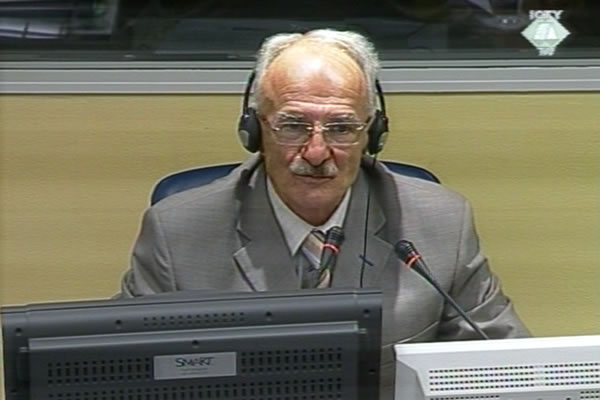Home
SERBIAN SERVICE AMONG THE EXTREMISTS
Testifying as Jovica Stanisic’s defense witness, former Serbian State Security Service operative tried to convince the judges that in the early nineties he and his colleagues were fighting the Muslim and Serbian extremists who wanted the war to spill over from BH to Serbia. He also accused the Yugoslav Army of recruiting volunteers with a criminal past
 Radenko Novakovic, defence witness of Jovica Stanisic
Radenko Novakovic, defence witness of Jovica Stanisic After a one-month break, the defense of Jovica Stanisic, former chief of the Serbian State Security Service, continued its case. The new witness is Radenko Novakovic, a former colleague of Stanisic and his erstwhile deputy, Franko Simatovic. Stanisic and Simatovic are charged with crimes committed by the Serbian paramilitary and police units in the wars in Croatia and BH. Radenko Novakovic was the chief of the State Security Service Operative Directorate in Belgrade in the second half of the nineties. Before that, he was in charge of counter-intelligence in the Uzice office in the period relevant for the indictment – from 1991 to 1995.
In his quite verbose evidence, Novakovic described his tasks at the job in Uzice, listing a number of activities aimed at suppressing Serbian and Muslim extremism. He claims that the State Security Service followed the groups and individuals who were members of militant wings in some Serbian parties and the Democratic Action Party, which was a Muslim party. The Service tried to prevent the spill-over of the war from BH to Serbia. Thus the Service operatives followed the Serbian volunteers who tried to take their weapons back home with them as they returned from the front lines, and the Muslim extremists who were planning terrorist actions in Serbia.
Defense counsel Jordash showed a State Security Service document from July 1993, reporting on the relationship between the Service and the intelligence organs in the Yugoslav Army (VJ). The report says that the relationship is ‘fraught with problems’; one of the issues is that the Army decided to recruit criminals, ‘which called for their release from prison’. The MUP was asked not to stand in the way of this recruitment process. As the witness recounted, the Uzice State Security Service brought up the criminal past of such individuals, but the Army nevertheless recruited them and sent them to the front lines in the VJ and Territorial Defense units.
At the beginning of Novakovic’s testimony, Judge Orie indicated that the Republic of Serbia had asked that he testify in closed session, but the Trial Chamber had rejected the demand. Instead, the judges ordered that the court go into so-called private session whenever mention is made of former Serbian State Security Service operatives and the sites used by the Service.
Linked Reports
- Case : Stanisic & Simatovic
- 2011-07-19 MINISTER WITH EMPTY POCKETS
- 2011-07-18 SHIFTING BLAME ON THE DEAD
- 2011-07-14 (UN)INFORMED WITNESS
- 2011-10-05 MILAN LUKIC IN THE HANDS OF THE SERBIAN STATE SECURITY
- 2011-10-06 SERBIAN STATE SECURITY SERVICE HAD DOUBLE STANDARDS
- 2011-10-07 OPERATION SPIDER: A MILITARY OR INTELLIGENCE OPERATION?
